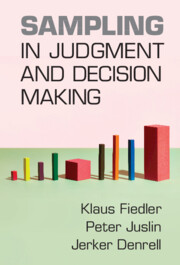Book contents
- Sampling in Judgment and Decision Making
- Sampling in Judgment and Decision Making
- Copyright page
- Contents
- Figures
- Tables
- Contributors
- Part I Historical Review of Sampling Perspectives and Major Paradigms
- Part II Sampling Mechanisms
- Chapter 5 The J/DM Separation Paradox and the Reliance on the Small Samples Hypothesis
- Chapter 6 Sampling as Preparedness in Evaluative Learning
- Chapter 7 The Dog that Didn’t Bark
- Chapter 8 Unpacking Intuitive and Analytic Memory Sampling in Multiple-Cue Judgment
- Part III Consequences of Selective Sampling
- Part IV Truncation and Stopping Rules
- Part V Sampling as a Tool in Social Environments
- Part VI Computational Approaches
- Index
- References
Chapter 5 - The J/DM Separation Paradox and the Reliance on the Small Samples Hypothesis
from Part II - Sampling Mechanisms
Published online by Cambridge University Press: 01 June 2023
- Sampling in Judgment and Decision Making
- Sampling in Judgment and Decision Making
- Copyright page
- Contents
- Figures
- Tables
- Contributors
- Part I Historical Review of Sampling Perspectives and Major Paradigms
- Part II Sampling Mechanisms
- Chapter 5 The J/DM Separation Paradox and the Reliance on the Small Samples Hypothesis
- Chapter 6 Sampling as Preparedness in Evaluative Learning
- Chapter 7 The Dog that Didn’t Bark
- Chapter 8 Unpacking Intuitive and Analytic Memory Sampling in Multiple-Cue Judgment
- Part III Consequences of Selective Sampling
- Part IV Truncation and Stopping Rules
- Part V Sampling as a Tool in Social Environments
- Part VI Computational Approaches
- Index
- References
Summary
Previous research demonstrates a large difference between decisions from description and decisions from experience, and also between decisions and probability judgment from experience. Comparison of decisions from description and from experience reveals a description–experience gap (Hertwig & Erev, 2009): higher sensitivity to rare events in decisions from description. Comparison of judgment and decisions from experience reveals the coexistence of overestimation and underweighting of rare events (Barron & Yechiam, 2009). The current review suggests that both sets of differences are examples of the J/DM separation paradox: While separated studies of judgment and decision making reveal oversensitivity to rare events, without the separation, these processes often lead to the opposite bias. Our analysis shows that the J/DM paradox can be the product of the fact that the separation of judgment from decisions making requires an explicit presentation of the rare events, and this mere presentation increases the apparent weighting of these events. In addition, our analysis suggests that feedback diminishes the mere presentation effect, but does not guarantee increase in rational behavior. When people can rely on accurate feedback, the main deviations from rational judgment and decision making can be captured with the reliance on the small samples hypothesis.
Keywords
- Type
- Chapter
- Information
- Sampling in Judgment and Decision Making , pp. 115 - 130Publisher: Cambridge University PressPrint publication year: 2023

